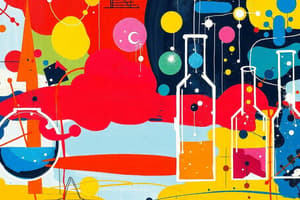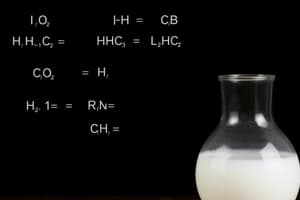Podcast
Questions and Answers
A _____________ __________ is the process by which one or more substances are changed into one or more different substances.
A _____________ __________ is the process by which one or more substances are changed into one or more different substances.
Chemical Reaction
The original substances in a chemical equation are known as the ______________ and the resulting substances are known as the ______________.
The original substances in a chemical equation are known as the ______________ and the resulting substances are known as the ______________.
Reactants, Products
According to the ___ __ _______________ __ _____, the total mass of reactants must be equal to the total mass of products for any given chemical equation.
According to the ___ __ _______________ __ _____, the total mass of reactants must be equal to the total mass of products for any given chemical equation.
Law of Conservation of Mass
A ________________ ____________ represents, with symbols and formulas, the identities and relative molecular or molar amounts of the reactants and products in a chemical reaction.
A ________________ ____________ represents, with symbols and formulas, the identities and relative molecular or molar amounts of the reactants and products in a chemical reaction.
Evidence that one or more substances have undergone a change in __________ are required to know that a chemical reaction has taken place.
Evidence that one or more substances have undergone a change in __________ are required to know that a chemical reaction has taken place.
Evolution of energy as ______ and _________ could indicate that a chemical reaction has taken place.
Evolution of energy as ______ and _________ could indicate that a chemical reaction has taken place.
The following observations may indicate a chemical reaction: release of both heat and light, change in ________, production of a ____, formation of a ______________.
The following observations may indicate a chemical reaction: release of both heat and light, change in ________, production of a ____, formation of a ______________.
A solid that is produced as a result of a chemical reaction in a solution that separates from the solution is known as a ______________.
A solid that is produced as a result of a chemical reaction in a solution that separates from the solution is known as a ______________.
What are the diatomic elements?
What are the diatomic elements?
According to the Law of Conservation of Mass, what happens to atoms in a chemical equation?
According to the Law of Conservation of Mass, what happens to atoms in a chemical equation?
A _____________ is a small whole number that appears in front of a formula in a chemical reaction.
A _____________ is a small whole number that appears in front of a formula in a chemical reaction.
An equation in which the reactants and products in a chemical reaction are represented by words is called a ________ __________.
An equation in which the reactants and products in a chemical reaction are represented by words is called a ________ __________.
The arrow in a chemical equation is read as _______.
The arrow in a chemical equation is read as _______.
A ___________ ___________ represents the reactants and products of a chemical reaction by their symbols or formulas.
A ___________ ___________ represents the reactants and products of a chemical reaction by their symbols or formulas.
Word equations and formula equations are qualitative statements that provide detailed information about the amounts of reactants and products.
Word equations and formula equations are qualitative statements that provide detailed information about the amounts of reactants and products.
Changing the subscripts of a chemical formula changes the __________ of the compound.
Changing the subscripts of a chemical formula changes the __________ of the compound.
Sometimes a gaseous product is indicated by an arrow pointing __________. A __________ arrow is often used to show the formation of a precipitate.
Sometimes a gaseous product is indicated by an arrow pointing __________. A __________ arrow is often used to show the formation of a precipitate.
Many reactions are speeded up and can take place at ________ temperatures in the presence of a catalyst.
Many reactions are speeded up and can take place at ________ temperatures in the presence of a catalyst.
A ___________ is a substance that changes the rate of a chemical reaction but can be recovered unchanged.
A ___________ is a substance that changes the rate of a chemical reaction but can be recovered unchanged.
A _______________ ____________ is a chemical reaction in which the products reform the original reactants.
A _______________ ____________ is a chemical reaction in which the products reform the original reactants.
The coefficients of a chemical reaction indicate ___________ amounts of reactants and products.
The coefficients of a chemical reaction indicate ___________ amounts of reactants and products.
The _____________ ________ of the reactants and products of a chemical reaction can be determined from the reaction's coefficients.
The _____________ ________ of the reactants and products of a chemical reaction can be determined from the reaction's coefficients.
The __________ __________ for a chemical equation has the same relative amounts of substances as the forward reaction.
The __________ __________ for a chemical equation has the same relative amounts of substances as the forward reaction.
A chemical equation doesn't provide all information: Don't know if the reaction ____ occur, No information about the _______ it occurs at.
A chemical equation doesn't provide all information: Don't know if the reaction ____ occur, No information about the _______ it occurs at.
_______________ forms the basis for confirming that a particular chemical reaction will occur.
_______________ forms the basis for confirming that a particular chemical reaction will occur.
In a ____________ ____________, also known as a composition reaction, two or more substances combine to form a new compound.
In a ____________ ____________, also known as a composition reaction, two or more substances combine to form a new compound.
Almost all metals react with oxygen to form _________.
Almost all metals react with oxygen to form _________.
Many oxides of nonmetals in the upper-right portion of the periodic table react with water to produce _____________.
Many oxides of nonmetals in the upper-right portion of the periodic table react with water to produce _____________.
In a _____________ __________, a single compound undergoes a reaction that produces two or more simpler substances.
In a _____________ __________, a single compound undergoes a reaction that produces two or more simpler substances.
Most decomposition reactions take place only when energy in the form of ____________ or _______ is added.
Most decomposition reactions take place only when energy in the form of ____________ or _______ is added.
The decomposition of a substance by an electric current is called ______________.
The decomposition of a substance by an electric current is called ______________.
Who discovered oxygen through a decomposition reaction?
Who discovered oxygen through a decomposition reaction?
In a _______________ ________, also known as a replacement reaction, one element replaces a similar element in a compound.
In a _______________ ________, also known as a replacement reaction, one element replaces a similar element in a compound.
The amount of energy required in single-displacement reactions is ____________ than the amount involved in synthesis or decomposition reactions.
The amount of energy required in single-displacement reactions is ____________ than the amount involved in synthesis or decomposition reactions.
In ________________ __________s, the ions of two compounds exchange places in an aqueous solution to form two new compounds.
In ________________ __________s, the ions of two compounds exchange places in an aqueous solution to form two new compounds.
_____________ _____ remain in solutions as aqueous ions.
_____________ _____ remain in solutions as aqueous ions.
In a _______________ ____________, a substance combines with oxygen, releasing a large amount of energy in the form of light and heat.
In a _______________ ____________, a substance combines with oxygen, releasing a large amount of energy in the form of light and heat.
Combustion always results in the production of ________ ___________ and _________.
Combustion always results in the production of ________ ___________ and _________.
The ability of an element to react is referred to as the element's ____________.
The ability of an element to react is referred to as the element's ____________.
The more readily an element reacts with other substances, the _____________ its activity is.
The more readily an element reacts with other substances, the _____________ its activity is.
An ___________ _________ is a list of elements organized according to the ease with which elements undergo certain chemical reactions.
An ___________ _________ is a list of elements organized according to the ease with which elements undergo certain chemical reactions.
For metals, greater activity means a greater ease of _____ off electrons to form positive ions.
For metals, greater activity means a greater ease of _____ off electrons to form positive ions.
For nonmetals, greater activity means a greater ease of _____ of electrons, to form negative ions.
For nonmetals, greater activity means a greater ease of _____ of electrons, to form negative ions.
The most-active element, placed at the top of the activity series, can replace each of the elements _________ it from a compound in a single-displacement reaction.
The most-active element, placed at the top of the activity series, can replace each of the elements _________ it from a compound in a single-displacement reaction.
If the element can't replace another element according to the activity series, you write '__ _________' in the chemical equation.
If the element can't replace another element according to the activity series, you write '__ _________' in the chemical equation.
Many single displacement reactions occur in ____________ solutions.
Many single displacement reactions occur in ____________ solutions.
Flashcards are hidden until you start studying
Study Notes
Chemical Reactions
- A chemical reaction involves the transformation of one or more substances into different substances.
- Original substances are known as reactants; resulting substances are called products.
Law of Conservation of Mass
- The total mass of reactants equals the total mass of products in any chemical equation.
- Atoms are neither created nor destroyed, ensuring equal numbers on both sides of the equation.
Chemical Equations
- A chemical equation uses symbols and formulas to represent the identities and amounts of reactants and products.
- Balancing equations involves using coefficients, which are whole numbers that precede formulas.
Evidence of Chemical Reactions
- Changes in identity, energy evolution (heat and light), color changes, gas production, and precipitate formation indicate a chemical reaction.
- A precipitate is a solid formed from a reaction that separates from a liquid solution.
Diatomic Elements
- Certain elements exist naturally as diatomic molecules, represented by Br I N Cl H O F.
Types of Equations
- Word equations provide a qualitative statement of reactants and products without quantitative information.
- Formula equations use chemical symbols or formulas to represent the reaction.
Reaction Direction and Temperature
- Arrow direction in equations indicates product formation or states (upward for gas, downward for precipitate).
- Reactions can occur at lower temperatures in the presence of a catalyst, which alters the reaction rate but is unchanged afterward.
Reaction Types
- Synthesis reactions combine two or more substances to form one compound.
- Decomposition reactions break down a single compound into simpler substances, often requiring energy (electricity or heat).
- Single-displacement reactions involve one element replacing a similar element in a compound, while double-displacement reactions have two compounds exchanging ions.
Combustion Reactions
- A combustion reaction combines a substance with oxygen, releasing significant energy, producing carbon dioxide and water.
- The activity series ranks elements by their reactivity; more active elements can displace less active ones in reactions.
Aqueous Solutions
- Many single-displacement interactions occur in aqueous solutions, where spectator ions remain unchanged during reactions.
Confirming Reactions
- Experimentation is essential to determine if a chemical reaction will occur and under what conditions.
Studying That Suits You
Use AI to generate personalized quizzes and flashcards to suit your learning preferences.




